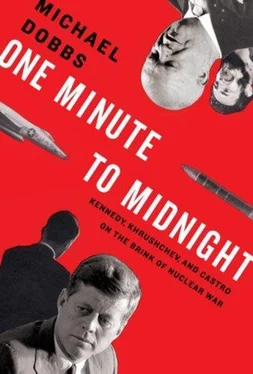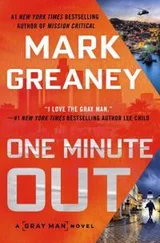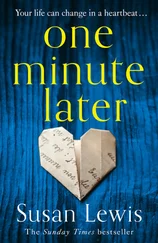Even as he prepared for war, Kennedy was attempting to salvage the peace with a series of fallback positions. In addition to his informal promise to Khrushchev to withdraw American missiles from Turkey, he had privately agreed to a suggestion by Dean Rusk on a discreet approach to the secretary-general of the United Nations. It would be easier for the United States and its allies to accept a dramatic last-minute plea for a Cuba-Turkey trade from U Thant than from Khrushchev. With Kennedy’s consent, Rusk telephoned a former UN official named Andrew Cordier, who was known to be close to U Thant. If Khrushchev rejected the secret deal outlined by Bobby to Dobrynin earlier in the evening, Cordier would get the secretary-general to publicly call for the removal of missiles from both Cuba and Turkey.
But first the allies had to be prepped to accept such a deal. The Turkish government in particular regarded the Jupiters as a symbol of its international manhood and was loath to give them up. Rather than withdraw the missiles unilaterally, Kennedy wanted America’s NATO allies to fully understand the probable military consequences of rejecting “a Cuba-Turkey connection.” The alternative to a deal was a U.S. attack on Cuba, followed by some kind of Soviet attack on Turkey or on Berlin. If this happened, Kennedy did not want the allies to say, “We followed you, and you bitched it up.”
The timetable for diplomacy was getting very tight. The Pentagon was calling for air attacks on Cuba to begin by Monday, October 29, in the absence of firm evidence that the Soviets were dismantling their missile sites. A meeting of the NATO Council had been called for Sunday morning in Paris. There was practically no time for NATO ambassadors to get instructions from their governments. Kennedy proposed pushing the military schedule back a few hours to give everybody a “last chance” to come up with something. Under the president’s revised timetable, the bombing of Cuba would begin on Tuesday, October 30, followed by an invasion seven days later.
After Kennedy left the Cabinet Room, a few ExComm members lingered behind, exchanging desultory conversation.
“How are you doing, Bob?” RFK asked McNamara with forced jocularity.
The defense secretary did not want to admit his exhaustion. “Well,” he replied. “How about yourself?”
“All right.”
“You got any doubts?”
“No, I think we’re doing the only thing we can do.”
McNamara’s brain was still clicking away, thinking ahead. “We need to have two things ready,” he told the others. “A government for Cuba, because we’re gonna need one after we go in with five hundred aircraft. And secondly, some plans for how to respond to the Soviet Union in Europe, ’cause sure as hell they’re gonna do something there.”
RFK was dreaming of revenge. “I’d like to take Cuba back. That’d be nice.”
“Yeah,” agreed John McCone. “I’d take Cuba away from Castro.”
Someone else joked about putting the Mongoose crowd in charge.
“Suppose we make Bobby mayor of Havana,” kidded one of the Boston Irishmen.
The tension dissolved into laughter.
The question of who should form the next government of Cuba was also on the minds of Cuban experts at the Department of State. Earlier in the day, the coordinator for Cuban affairs had signed off on a three-page memorandum proposing the creation of a “Junta for an Independent and Democratic Cuba.” The Junta would serve as an advisory body to a military government during “the combat phase of operations,” becoming a “rallying point” for all Cubans opposed to Castro.
The experts warned against any attempt to return Cuba to the discredited Batista era. Instead, the Junta should stress the idea that Castro had betrayed the revolution and the Cuban people now had “a real chance to carry out the original revolutionary program.” The State Department’s list of “prominent Cubans” aligned neither with Batista nor with Castro was headed by Jose Miro Cardona.
With his large spectacles, thinning hair, and trim mustache, Miro looked like the lawyer and university professor he had been before becoming a politician. The former president of the Cuban Bar Association had served as figurehead prime minister of Cuba after the triumph of the revolution in early 1959, lasting for fifty-nine days before being replaced by Castro. “I cannot run my office while another man is trying to run it from behind a microphone,” he explained to a friend. With his moderate conservative views and anti-Batista, anti-Castro credentials, he was Washington’s perennial choice to head a new Cuban government.
The role of Cuban leader-in-waiting was frustrating and thankless. Miro had seen his hopes rise and fall many times as his American sponsors bickered, schemed, and prevaricated over how to get rid of Castro. The most bitter disappointment had come in April 1961 when the CIA persuaded Miro and his friends to support the Bay of Pigs invasion. As the guerrillas waded ashore, Miro and other members of the Revolutionary Council were spirited away to a safe house in Miami by their CIA handlers, ready to move to the first available chunk of “free Cuba.” The call never came. Instead of returning home as heroes, the exile leaders were kept locked up in the house for three days, unaware of the disaster unfolding on the beaches. When it was all over, many of them broke down and wept. Among the 1,180 men captured by Castro’s forces at the Bay of Pigs was Miro’s own son.
The exile leaders were flown to Washington to meet with the president. “I know something of how you feel,” Kennedy had told them. “I lost a brother and a brother-in-law in the war.” He assured them that his commitment to a free Cuba was “total.” There would be other opportunities. Miro met with the president several times over the next year and a half, coming away with a different impression every time he left the Oval Office. The discovery of Soviet missiles on Cuba persuaded him that the day of liberation had finally arrived.
Miro spent much of Saturday meeting with U.S. government officials in Miami. They told him that Cuban refugees serving in the armed forces were being kept at “maximum readiness,” pending orders to land in Cuba. With an invasion apparently only hours away, they discussed “final details concerning the establishment of a Cuban belligerent government on liberated territory.” After returning home, the exile leader asked an aide to draft a proclamation celebrating the island’s “new dawn of freedom”:
We do not come with impulses of vengeance, but with a spirit of justice. We do not defend the interests of any sector, nor do we intend to impose the will of any ruler. We come to restore the right of the Cuban people to establish their own laws and to elect their own government. We are not invaders. Cubans cannot invade their own land….
Cubans! Throw off the hammer and sickle of Communist oppression. Join the new battle for independence. Take up arms to redeem the nation, and march resolutely on to victory. Our sovereign flag proudly waves its splendid colors, and the island rises with the stirring cry of liberty!
In CIA safe houses around Miami, seventy-five guerrilla fighters were waiting impatiently to hear when they would be leaving for Cuba. They were organized into twenty separate teams, most with two to five members. One group had twenty members. The infiltration operation had been mysteriously put “on hold” on Friday afternoon following Bobby Kennedy’s confrontation with Bill Harvey at the Mongoose meeting in the Pentagon. Nobody seemed to know what was happening, but some fighters were beginning to wonder if the Kennedys had lost their nerve again.
The reports of dissent in the ranks filtered up to Washington via the CIA station chief in Miami. After eight months in Florida, Ted Shackley had come to view the Cubans as a “volatile, emotional, expressive people.” He worried what would happen if the operation was called off altogether and the teams disbanded. Cubans being Cubans, there was a great risk that the disillusioned fighters “would talk and their experience would sweep [the] exile community like wildfire.” If that happened, the story would inevitably “hit press.” Shackley outlined his concerns in flawless agency bureaucratese, describing “nuts and bolts intelligence realities based on clinical objective appraisal our situation.” He began by emphasizing that his men were at “highest possible pitch of motivation and state of readiness” following “equipment checkout, commo briefings, discussion infil routes.” He continued in a darker vein:
Читать дальше












